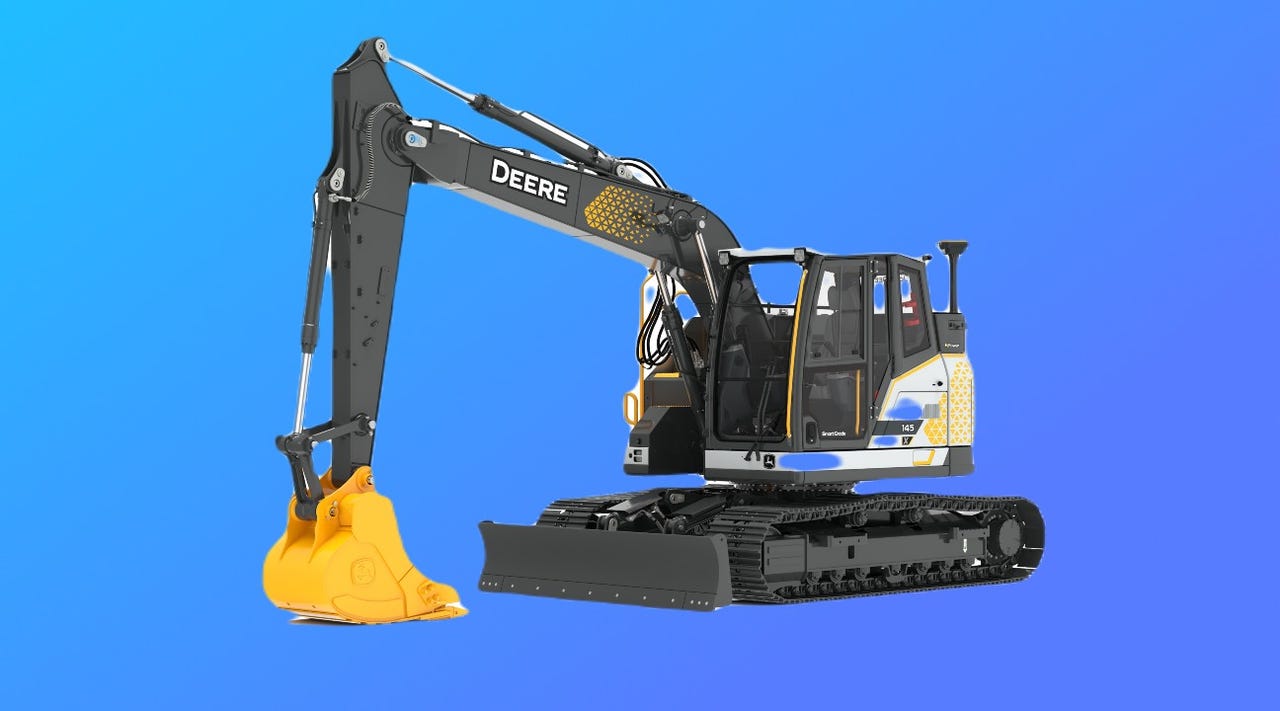John Deere rolls out new battery-powered farming and construction equipment


John Deere's electric excavator.
For the first day of CES, John Deere, a leader in the farming and heavy machinery industries, announced two new technologies and detailed innovations it released earlier in 2022.
John Deere CEO John May delivered a keynote speech touching on a series of real-world situations John Deere's technology hopes to address. In the speech, May mentioned that a growing population, decreased amounts of arable land, and increased greenhouse gas emissions are all considered when John Deere releases new farming and construction technologies.
Also: The drone wranglers: How an Old West town is delivering the future of flight
The themes of his keynote focused on technologies integrated into John Deere's heavy machinery. Products like ExactShot, See and Spray, and John Deere's new electric excavator rely on innovations like biofuels, electrification, autonomy, and cloud computing.
ExactShot
ExactShot, a technology made for farmers, uses sensors and robotics to dispense a more precise amount of starter fertilizer required during the planting process.
ExactShot's built-in sensors know when a seed is being planted and will dispense the required amount of fertilizer, about 0.2 milliliters. With ExactShot, John Deere says US corn crops could save over 93 million gallons of fertilizer and decrease the effects runoff fertilizer can have on surrounding water supply and greenery.
Special Feature
ExactShot can spray fertilizer up to 10 miles per hour, covering more land and fertilizing seeds faster and more accurately than farmers can by hand. One ExactShot machine can cover 34 million seeds per day.
Also: ZDNET's guide to CES: What is it, when is it, and who can attend?
With ExactShot, John Deere says it hopes to help address issues like sustainability and a growing population. According to the company, farmers will need to up food production by 60% to 70% to feed everyone, and ExactShot can help make food production more efficient.
Jahmy Hindman, John Deere's CTO, said during the keynote address that, across the US, farmers use about 140 million gallons of starter fertilizer every year at the beginning of the crop season. ExactShot can decrease the amount to 93 million gallons. Its technology distributes fertilizer directly to the seeds instead of administering extra fertilizer to a row of seeds.
See and Spray Ultimate
Last year, John Deere announced an upgrade to the original See and Spray technology: See and Spray Ultimate. See and Spray Ultimate targets weeds that lie in corn, soybean and cotton plants, releasing herbicides with precision to kill the weeds without harming benign crops and greenery.
Featured
See and Spray Ultimate uses machine learning to understand when to spray weeds and when to avoid spraying crops with herbicides. The machine is also equipped with "eyes" that detect an object that's not the sky, land, or treeline to stop the machine from plowing over a person or animal.
Also: Delta to extend free Wi-Fi across all flights
Hindman said that farmers across the US use 23 million gallons of herbicide annually to kill weeds. With See and Spray Ultimate, that number decreases to eight million gallons.
See and Spray Ultimate has 126 cameras capable of capturing 1.6 billion pixels. The cameras are ultra-rugged and built for rough terrain and harsh weather conditions. The sprayer's body is embedded with 10 advanced computing processors that can process up to four gigabytes of data per second.
Electric excavator
A Kreisel battery powers the electric excavator, increasing the machine's efficiency. As a result, the excavator promises lower operating costs, reduced noise, more reliability, and no emissions on construction sites.
Kreisel electric charging technology also promises decreased cost connections and electrical burdens on the electrical grid. Electric machines reduce noise pollution caused by heavy construction machinery and decrease combustion emissions in urban areas.
Biofuels, electrification, autonomy, and cloud computing
According to Hindman, total electrification of all vehicles and heavy machinery would lead to increased technical issues and decreased reliability, primarily for farming and construction equipment. John Deere is investing in biofuels, such as ethanol and renewable diesel, to mitigate this issue while reducing greenhouse gas emissions.
John Deere tractors and heavy machinery use a hybrid mix of electric, rechargeable batteries, and biofuel.
During the keynote speech, May reminisced on the announcement of John Deere's automated tractor at CES 2022. He also detailed the John Deere Operation Center, software built into the machines that houses farmers' data about their fields.
In the operations center, farmers can access insights, share data, and use over 200 apps from other software companies to help them decide when to plant certain crops and how deep farmers should plant them based on previous data.
With this data, farmers can create digital twins of their farms to see which crops can thrive, given their farm's soil type and weather patterns.